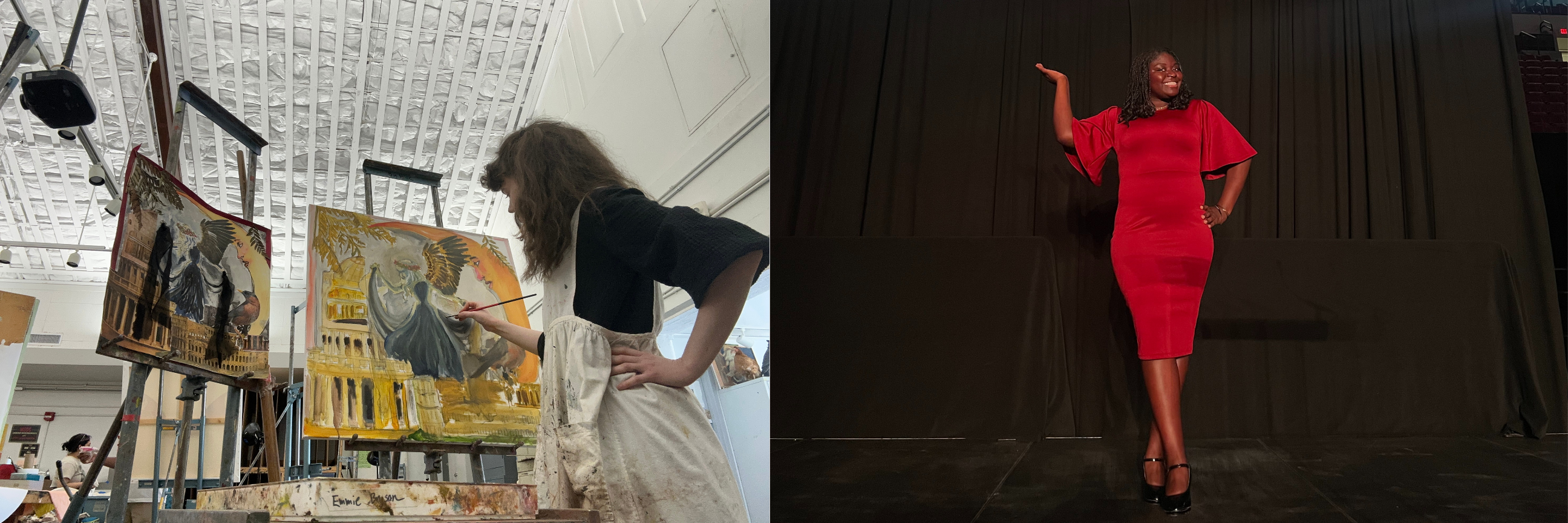14 Honors in the Major Students Collect 2024 IDEA Grant
By: Brian Wilcoxon | Published: April 12, 2024

Emmie Bryson and Gladine Lamarre both received IDEA grants to continue their research thesis project in the FSU Honors in the Major program.
Emmie Bryson practically fell out of her seat recalling the moment she discovered she was a recipient of the 2024 IDEA Grant. “I was waiting for my order in the middle of the Azalea Hall food court when I got the email, and I just started screaming. My friend was holding me, we were jumping up and down… Thinking of it now makes me giddy!” Bryson is one of 14 students whose Honors in the Major (HITM) research led to a successful IDEA Grant application, and one of just 28 individuals and two groups across FSU to win the prestigious award this year.
The IDEA Grant offers funding of up to $4000 per individual (or $6000 for a group) for self-designed work on a topic, project, problem, artistic product or performance, or other entrepreneurial or creative idea. David Montez, Associate Director of FSU’s Center for Undergraduate Research (CRE), oversees the IDEA Grant program and is part of the committee who makes decisions about the awards. “Our goal at CRE is to be able to provide resources and opportunities for students at any stage of research. The IDEA Grant is a way not just to showcase all the innovative work that students are doing at FSU, but to offer them support to continue that work.”
While the process of creating an IDEA Grant application is straight-forward, it requires a significant amount of pre-planning and thoughtfulness. Students must have a faculty sponsor, write an abstract, describe their project, and create a budget for the money they hope to receive. Because students pursuing an Honors in the Major project think through these steps in their initial project proposal, they often have a head start when it comes to the IDEA Grant application. “Our students have to have a faculty mentor in their department, and they work through a multitude of research and academic issues at the start of their HITM projects,” said Dr. Michael Franklin, Assistant Director and specialized faculty in Honors who oversees the Honors in the Major program. “That work gives these students a lot of practical skills they can use for applications of all sorts. The IDEA Grant is a natural first step for funding for HITM students.”
Emmie Bryson followed this path to her IDEA Grant. As she progressed through her BFA in Fine Arts, she came to realize the value that research would have on the pieces she created. “Honors in the Major allowed for a combination of creative and research endeavors. I realized I wanted to study the history of art and learn from it, and engage in that conversation by contributing to it.” Bryson’s project reinterprets eight fictional women through history who were typically depicted by men. “Women have historically been excluded from controlling their own narratives. This work looks at how agency is constructed and women’s role in that.” Her work will result in eight unique pieces, using a different artistic medium for each. “Each work will require a significant amount of material. I’m constructing a historically accurate Victorian-era gown from silk taffeta, which is really expensive. The IDEA Grant is making it possible for me to purchase all of these supplies.”
The IDEA Grant is also opening pathways for Gladine Lamarre, a Criminal Justice major whose work focuses on human rights in the American prison system, particularly the impact of solitary confinement. “I realized that getting documents and doing a meta-analysis would require access, and new software to be able to process all of this data,” she said. As a first-generation student, Lamarre was acutely aware of the financial burden of doing high-level undergraduate research, but she was reassured after attending meetings about Honors in the Major. “I was told, ‘Don’t limit what you think you can do just because you don’t have the money yet. There are ways to help with that.’” Lamarre received the Lisa Scott IDEA Grant, set aside specifically to help first-generation students complete significant undergraduate research.
Both Bryson and Lamarre consider their Honors in the Major work and the IDEA Grant as significant steps toward their future goals. “The IDEA Grant is helping me make a huge portfolio that shows I consider art in a deep way,” said Bryson, who hopes to apply for a Fulbright, and eventually, to use this body of work as part of an application for MFA programs. Lamarre, who plans to study law, suggested that this process taught her new things about herself. “I wasn’t a researcher before this,” she said, noting that Dr. Steven Zane, her faculty mentor, imparted his own passion for research to her and has helped her ask new questions. “This research has not only opened my mind, but it’s opened my heart,” she said. “I’m getting to look at how solitary confinement impacts individuals, families, and the society when the individual reenters. The IDEA Grant is going to allow me to tell these stories and bring more understanding to these situations.”
Montez said that he hopes the IDEA Grant not only brings awareness to the undergraduate research being done at FSU, but allows it to have impact beyond this community. “These projects are really innovative, and these students are saying things that matter to the broader world,” he said. Lamarre echoed these sentiments when constructing her application, saying, “At the end of the day, I’m representing Florida State University, and I want to make sure I’m making an impact as an FSU student on society.”
